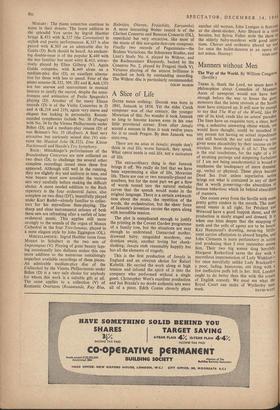A Slice of Life
DATES mean nothing : Dvorak was born in 1841, Janacek in 1854. Yet the elder Czech composer was of that century, the younger Moravian of this. No wonder it took Janacek so long to become known even in his own little provincial corner. Even after Jenufa scored a success in Brno it took twelve years for it to reach Prague. By then Janacek was sixty-two.
There are no arias in Jenufa; people don't think in real life, wrote Janacek, they speak. What opera needs is real life, not a caricature of life.
The extraordinary thing is that Janacek brings it off. We really do feel that we have been experiencing a slice of life, Moravian life. There are one or two naturally-placed set numbers, but for the most part we get a flow of words turned into the natural melodic curves that the speech would make in the original language. There is a certain awkward- ness about the music, the repetition of the words, the orchestration, but the sheer force of Janacek's invention carries the opera along with incredible tension.
The plot is complicated enough to justify the printing in the Covent Garden programme of a family tree, but the situations are easy enough to understand. Unmarried mother, drowned baby, misguided murderer, one drunken swain, another loving but cheek- slashing; Jenufa ends reasonably happily but has all the elements of tragedy.
This is the first production of Jenufa in England and an obvious choice for Rafael Kubelik. He carried the work along at high tension and • infused the spirit of it into the company who performed without a single guest. Christopher West's excellent production and Jan Brazda's no doubt authentic sets were all of a piece. Edith Coates cleverly plays another old woman, John Lanigan is first-rate as the cheek-slasher, Amy Shuard is a vivid heroine, but Sylvia Fisher stole the show as the elderly baby-murderer with good inter' tions. Chorus and orchestra played up and for once the ballet-dancers in an opera did










































 Previous page
Previous page